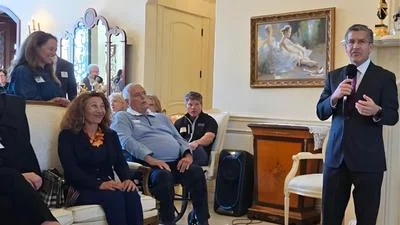Rep. Robert Martwick (D-Chicago) wasn't being sincere when he explained his 'yes' vote on a property tax freeze he hates, a high-ranking Northwest GOP Club official told the North Cook News recently.
Martwick gets his orders from House Speaker Mike Madigan, the club's chairman, Matt Podgorski, said in an email.
"This whole situation is bizarre," Podgorski wrote. "Martwick does what Madigan tells him to do, so he must have got his permission on this one."

Illinois State House Speaker Mike Madigan
On June 27, in the middle of the 10-day special session being held in search of a balanced budget, Martwick helped get the property tax freeze out of committee.
"There will be municipalities that lay off public sector servants like police officers and firefighters, and people will suffer for this," Martwick said. "I hate this idea. That being said, I want a budget and I have committed to the Speaker that despite my opposition to this I will vote for this. Why? Because this bad idea is one the governor will not budge on."
Martwick profits from lowering property tax bills for corporate clients, according to a report last summer by the Illinois Policy Institute, a Chicago conservative think tank.
Madigan, who also is part of a property tax law firm in Cook County, likewise officially hates the property tax freeze and criticizes Republican Gov. Bruce Rauner for demanding it. But he has approved it as part of a compromise.
"Only because the governor wants to impose that on people who depend upon public schools to education children, OK?" Madigan said. "It’s part of the extreme right agenda."
Podgorski said real property tax reform is still nowhere in sight.
"I am interested in a real and permanent state-wide property tax freeze," he wrote. "Not one that has a ton of exemptions. Property taxes need to be capped at a fixed percent of home value permanently and at the current dollar amount or less for ten years."
House Democrats introduced a spending plan on June 27, but other than that, there has been no word of budget progress coming out of Springfield.
The spending plan includes the four-year property tax freeze, a 32 percent increase in the state's currently flat personal income tax rate and a spike in spending for education and social service programs.
The gulf is wide between the proposal and Rauner's preferred budget plan, introduced before the special session, which includes approximately $5 billion in taxes and caps spending at $36 billion.
It isn't clear how much the sudden resignation of Senate Minority Leader Christine Radogno (R-Lemont) will complicate reaching a balanced budget agreement. Rauner has said that if lawmakers don't reach a deal by Friday, he will keep them in special session until they do.
Getting there requires spending reductions, Podgorski said.
"We need to focus on cutting spending at the state level by about $9 billion per year, period," he wrote. "Municipalities like Chicago need to cut spending big time as well as shore up their pensions."





 Alerts Sign-up
Alerts Sign-up